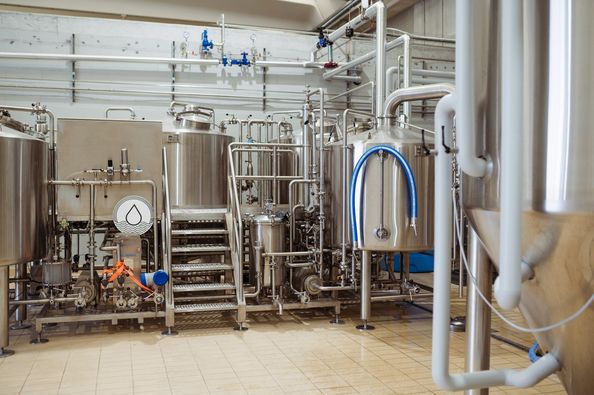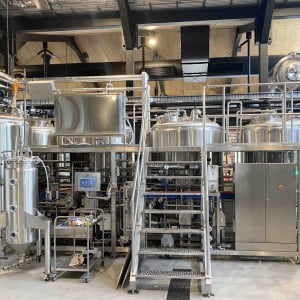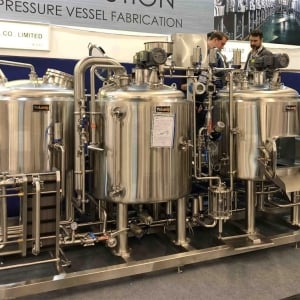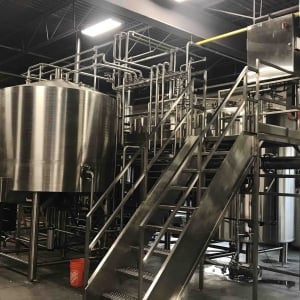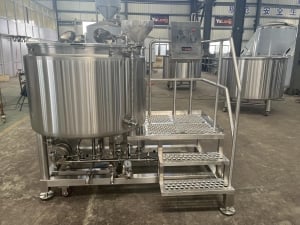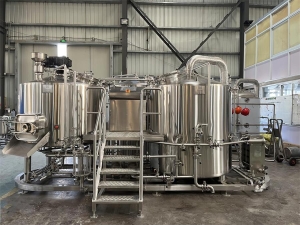Table of Contents
ToggleWhat is Brewing Equipment?
Brewing equipment refers to the various tools and apparatuses used in the process of brewing beverages like beer, wine, and spirits. From large-scale operations to the at-home enthusiast, the complexity and type of equipment can vary widely. Here’s a breakdown:
- Home Brewing: Typically includes smaller-scale equipment like fermentation buckets, airlocks, bottling equipment, and kitchen-scaled ingredients.
- Microbreweries: They are equipped with larger systems that can produce anywhere from a few gallons to several barrels of beer. They might have specialized tanks, industrial-sized mash tuns, and a more sophisticated bottling and labeling system.
- Large Breweries: They have an even more extensive set-up, with massive fermentation tanks, automated bottling lines, and extensive quality control measures.
| Equipment Type | Description | Typical Use |
|---|---|---|
| Fermentation Tank | Where the beer ferments. | All brewing operations |
| Mash Tun | Where grains are soaked to release sugars. | Primarily beer brewing |
| Airlock | Lets CO2 out without letting air in. | Essential for fermentation |
| Bottling Kit | For transferring beer to bottles. | Home brewing and microbreweries |
| Quality Control | Tools for checking alcohol content, etc. | Essential for professional breweries. |
While the basics of brewing remain the same – combining water, grain, yeast, and hops to produce beer – the equipment used can range from simple to high-tech.
Applications in Daily Life: Even if you’re not a beer drinker, you’ve likely come across brewing equipment in some form. From the local craft brewery in your town to the massive beer factories producing popular brands, these tools are vital to creating consistent and flavorful drinks.
The Evolution: Brewing equipment has evolved over the years. Centuries ago, beer was brewed in open vats and fermented in wooden barrels. With advancements in technology, the brewing process has become more refined, ensuring purity, consistency, and taste.
How much does Brewing Equipment cost?
Brewing equipment can vary widely in cost, depending on the scale and specifics of the desired brewing process. From the beginner’s homebrewing kit to industrial-sized setups for large breweries, the price points can span a wide range.
1. Home Brewing Kits: For those just starting out or those brewing as a hobby, homebrewing kits are the most economical choice. These typically include the essentials: fermentation bucket, airlock, siphon, and sometimes ingredients for a batch.
2. Microbrewery Setups: These are intermediate-level setups ideal for small commercial endeavors or passionate hobbyists. They often include larger fermentation vessels, professional-quality kettles, and more advanced bottling and labeling systems.
3. Industrial Brewery Equipment: These are the behemoths of the brewing world, designed for mass production. They come with large fermentation tanks, advanced filtration systems, and sophisticated quality control tools.
| Equipment Type | Home Brewing | Microbrewery | Industrial Brewery |
|---|---|---|---|
| Fermentation Tank | $20-$100 | $500-$5,000 | $20,000-$200,000 |
| Mash Tun | $50-$200 | $1,000-$10,000 | $50,000-$500,000 |
| Airlock | $2-$10 | Included with tanks | Included with tanks |
| Bottling Kit | $20-$50 | $500-$5,000 | $10,000-$100,000 |
| Quality Control Tools | $10-$100 | $500-$5,000 | $5,000-$50,000 |
Specific Brand Prices: Brands such as Blichmann, BrewMagic, and Ss Brewtech offer brewing equipment across various price points. For instance, Blichmann’s entry-level kettle might cost around $250, while their more advanced systems can go up to $5,000. BrewMagic’s V350ms system, known for its precise temperature control, is priced around $6,500. On the other hand, Ss Brewtech offers a 1bbl Nano brewhouse for about $10,000, ideal for small commercial setups.
Factors affecting prices include material quality, capacity, brand reputation, and any advanced features the equipment might have. Before making a purchase, it’s essential to balance one’s needs with the budget and consider potential future scaling.
Whether you’re a hobbyist, a budding microbrewery owner, or planning to enter the industry on a larger scale, understanding the price range and the value of each piece of equipment is essential to make informed decisions.
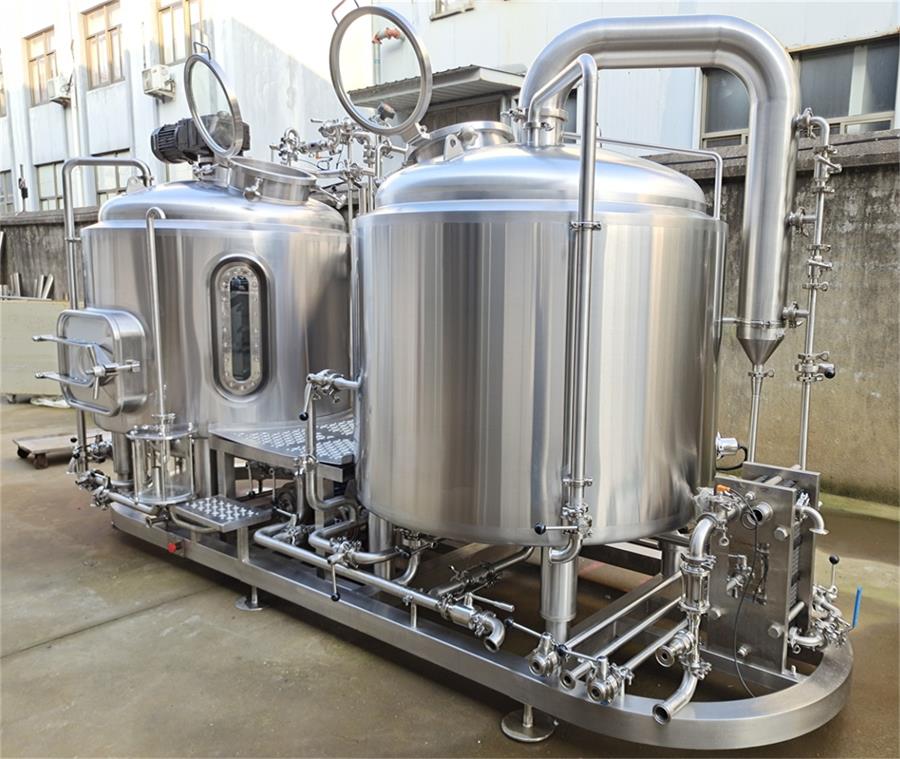
What are the Types of Brewing Equipment?
Brewing, an age-old practice, has evolved immensely over the years. The equipment used for brewing has transformed as well, moving from rudimentary tools to sophisticated machinery. Here’s a breakdown of the most common types of brewing equipment available today:
1. Fermentation Vessels: These are perhaps the most critical component in brewing. They house the brew as it ferments, transforming from a sugary liquid to the alcoholic beverages we know and love. Modern fermentation vessels are often made from stainless steel, but glass and food-grade plastic options are also available for home brewers.
2. Boilers or Brew Kettles: Used to boil the wort (unfermented beer) along with hops. The boiling process helps in sterilizing the wort and extracting flavors from the hops.
3. Mash Tuns: This is where the mashing process occurs, wherein grains are soaked in hot water to convert their starches into fermentable sugars. The result is a liquid called mash, which becomes the basis for brewing.
4. Wort Chillers: Post boiling, the wort needs to be cooled down quickly to a temperature suitable for yeast fermentation. Wort chillers are used to expedite this cooling process, ensuring the wort reaches a safe temperature in a matter of minutes.
5. Bottling and Packaging Equipment: Once the brewing and fermentation process is complete, the beverage needs to be transferred into bottles or cans for storage and sale. This equipment helps in the efficient filling, capping, and labeling of the final product.
| Equipment Type | Price Range | Common Materials |
|---|---|---|
| Fermentation Vessels | $20 – $200,000 | Stainless steel, glass, plastic |
| Boilers/Brew Kettles | $50 – $500,000 | Stainless steel |
| Mash Tuns | $50 – $300,000 | Stainless steel, copper |
| Wort Chillers | $50 – $10,000 | Copper, stainless steel |
| Bottling Equipment | $20 – $100,000 | Various metals, plastic |
This table provides a broad price range for each type of equipment. It’s essential to note that the cost can vary based on the equipment’s size, quality, brand, and functionality.
Functions of Brewing Equipment
The brewing process, despite its complexities, seeks to achieve one goal: producing high-quality beverages. The various equipment used in brewing each serve specific functions that contribute to the final product’s taste, aroma, and appearance. Let’s delve into the primary functions of some key brewing equipment:
1. Fermentation Vessels: These vessels provide a sealed environment where yeast can ferment the wort without any external contamination. The design ensures consistent temperature and pressure, both critical for efficient fermentation.
2. Boilers or Brew Kettles: Their main function is to boil the wort, which achieves three primary things: sterilizing the liquid, breaking down unwanted proteins, and extracting flavors from the hops.
3. Mash Tuns: Mash tuns facilitate the enzymatic conversion of starches in grains into fermentable sugars. This is crucial because it’s these sugars that the yeast will ferment to produce alcohol.
4. Wort Chillers: Rapid cooling of the boiled wort is essential. If wort remains at high temperatures for too long, it can lead to off-flavors in the final beer. Wort chillers ensure the temperature drops quickly to avoid any unwanted bacterial growth.
5. Bottling and Packaging Equipment: Besides the obvious function of filling bottles or cans, this equipment also ensures that the packaging is airtight. This prevents any external contamination and keeps the beverage fresh.
From the initial grain soaking to the final bottling, each piece of equipment plays its part in producing beverages of consistent quality and taste.
Applications of Brewing Equipment
Brewing equipment is not solely confined to the production of alcoholic beverages like beer or wine. Over the centuries, the use and applications of such equipment have diversified. In today’s modern age, brewing apparatuses are being employed in various industries and for numerous purposes. Here’s an exploration of these applications:
1. Beverage Production: This is the most obvious application. Brewing equipment is pivotal in the production of not just beer, but also wine, cider, and even certain distilled spirits.
2. Food Industry: Equipment like fermentation vessels can be used in food production, especially for items that require fermentation. Examples include sauerkraut, kimchi, and certain dairy products.
3. Research and Development: In scientific labs, equipment similar to brewing apparatuses can be used to study fermentation processes or to cultivate specific strains of bacteria or yeast for research purposes.
4. Teaching and Training: Educational institutions, especially those offering courses in food science or microbiology, utilize brewing equipment for practical training and demonstrations.
5. Personal Use: With the rise of the craft beer movement, more individuals are diving into home brewing as a hobby. As a result, there’s been an increase in the sale of smaller-scale brewing equipment for personal use.
6. Biofuel Production: In recent years, with the push towards sustainable energy, there’s been research into producing biofuels using fermentation processes similar to brewing.
7. Medicinal Production: Certain medicines or health supplements that require fermentation or cultivation of specific microbes are produced using equipment that bears a resemblance to brewing tools.
8. Cosmetic Industry: Some cosmetics and skincare products, like fermented serums, utilize fermentation processes in their production.
| Application | Equipment Commonly Used |
|---|---|
| Beverage Production | Fermentation vessels, Mash Tuns, Bottling equipment |
| Food Industry | Fermentation vessels, Boilers |
| Research and Development | Small-scale fermentation vessels, Lab-grade chillers |
| Teaching and Training | All types depending on curriculum |
| Personal Use | Home brewing kits, Fermentation buckets |
| Biofuel Production | Large fermentation vessels, Mash Tuns |
| Medicinal Production | Fermentation vessels, Sterilization equipment |
| Cosmetic Industry | Fermentation vessels, Quality control tools |
This table gives a snapshot of how brewing equipment finds its place in various industries. The versatility of these tools makes them invaluable across multiple domains.
How Brewing Equipment Benefits You
In the realm of beverage production, the significance of brewing equipment cannot be overstated. From enhancing the quality of your beverage to streamlining the brewing process, the right apparatus can offer numerous advantages. Here’s an exploration of the manifold benefits brewing equipment brings to the table:
1. Consistency: The most coveted trait for any brewer, amateur or professional, is achieving consistency in their brew. High-quality brewing equipment ensures that each batch is brewed under the same conditions, resulting in a consistent flavor profile batch after batch.
2. Efficiency: Modern brewing equipment, especially those designed for commercial purposes, is built to maximize output. With features that aid in faster heating, efficient cooling, and quick bottling, the entire brewing process becomes more streamlined.
3. Quality: Premium brewing equipment is manufactured to adhere to strict standards. This ensures that the materials in contact with the brew, like stainless steel or glass, do not leach any flavors into the beverage, thereby preserving its purity and taste.
4. Scalability: For those looking to expand their brewing operations, having scalable equipment is a boon. Many manufacturers design their equipment keeping future expansion in mind, allowing for seamless integration of additional components.
5. Safety: Brewing involves dealing with hot liquids, pressurized containers, and sometimes even glass. Well-designed brewing equipment incorporates safety features to minimize the risk of accidents.
6. Experimentation: Advanced brewing apparatuses come with features that allow brewers to experiment with different parameters. This could be adjusting the temperature, altering the fermentation time, or experimenting with different ingredients.
7. Return on Investment (ROI): For commercial brewers, investing in high-quality brewing equipment can lead to significant cost savings in the long run. Reduced wastage, increased output, and a consistent quality brew can boost sales and customer loyalty, ensuring a healthy ROI.
Investing in the right brewing equipment not only eases the brewing process but also enhances the final product’s quality, making the investment truly worthwhile.
How to Choose Brewing Equipment
Selecting the right brewing equipment can be a daunting task, especially with the plethora of options available in the market. However, understanding your needs and aligning them with the features of the equipment can simplify the decision-making process. Here’s a guide to help you navigate through the maze of brewing equipment choices:
1. Define Your Scale: Before diving into the specifics, it’s vital to determine the scale of your brewing operations. Are you a homebrew enthusiast or planning to open a microbrewery? Your scale will dictate the size and capacity of the equipment you need.
2. Material Matters: The material of the brewing equipment plays a crucial role in the brewing process. Stainless steel is the industry favorite due to its durability and non-reactive nature, ensuring no off-flavors in the brew.
3. Budget Considerations: Like any investment, it’s essential to set a budget. While it might be tempting to go for the most advanced setup, it’s crucial to strike a balance between what you desire and what you can afford.
4. Think Future: If you’re planning to expand in the future, consider investing in scalable equipment. This allows for easier integration of additional components and prevents the hassle of a complete overhaul later.
5. Safety and Compliance: Ensure that the equipment adheres to safety standards. For commercial brewers, it’s also essential to ensure that the equipment complies with local and national regulations.
6. Brand Reputation: Research brands and manufacturers. Opt for those with a good reputation in the industry. Customer reviews and expert opinions can provide insights into the equipment’s performance and reliability.
| Factor to Consider | Options | Notes |
|---|---|---|
| Scale | Homebrew, Microbrewery, Industrial | Choose based on your production size |
| Material | Stainless Steel, Glass, Plastic | Stainless steel is preferred for most components |
| Budget | $ – $$$ | Determine a budget and stick to it |
| Future Expansion | Scalable vs. Fixed | Consider if you plan to expand in the future |
| Safety & Compliance | Safety features, Regulation adherence | Ensure equipment is safe and compliant |
| Brand Reputation | Established vs. New brands | Research brand reputation before buying |
In essence, while choosing brewing equipment, it’s essential to prioritize your needs, budget, and future goals. Investing time in research can lead to a well-informed decision that serves you well for years to come.
Best 10 Brewing Equipment Manufacturers
The brewing equipment industry is vast, with several manufacturers vying for a brewer’s attention. However, some brands have stood the test of time and are revered for their quality, innovation, and reliability. Here’s a rundown of the top 10 brewing equipment manufacturers that have garnered respect and trust in the industry:
1. Blichmann Engineering: Known for their innovative designs, Blichmann offers a wide range of brewing equipment, from boilers to fermenters. Their products are cherished for their efficiency and durability.
2. BrewMagic: Pioneers in the sector, BrewMagic’s systems, especially the V350ms, are renowned for their precision and consistency.
3. Ss Brewtech: Offering solutions for both homebrewers and commercial setups, Ss Brewtech combines modern design with functionality.
4. Spike Brewing: Their stainless-steel vessels and fermenters are popular among both amateur and professional brewers for their quality and design.
5. BrauKon: Catering mainly to the professional brewing industry, BrauKon is known for its advanced brewing solutions and high-quality machinery.
6. Speidel: With over 100 years in the industry, Speidel offers a variety of brewing equipment, from tanks to mash systems, suitable for different scales of production.
7. GEA: A global powerhouse, GEA provides industrial-scale brewing solutions, known for their efficiency and technological advancements.
8. ProBrew: A newer entrant in the industry, ProBrew has quickly made a name for itself with its range of equipment, catering to both small-scale brewers and industrial setups.
9. Premier Stainless Systems: Specializing in stainless steel brewing equipment, they offer everything from keg washers to fermentation tanks.
10. MoreBeer!: Catering predominantly to homebrewers, MoreBeer! offers a diverse range of equipment and kits to get started with brewing at home.
| Rank | Manufacturer | Specialty |
|---|---|---|
| 1 | Blichmann Engineering | Innovative designs |
| 2 | BrewMagic | Precision and consistency |
| 3 | Ss Brewtech | Modern design |
| 4 | Spike Brewing | Stainless-steel equipment |
| 5 | BrauKon | Advanced brewing solutions |
| 6 | Speidel | Wide variety of equipment |
| 7 | GEA | Industrial-scale solutions |
| 8 | ProBrew | Equipment for various scales |
| 9 | Premier Stainless Systems | Stainless steel brewing equipment |
| 10 | MoreBeer! | Homebrewing equipment and kits |
Choosing the right manufacturer is paramount to ensuring a smooth and efficient brewing process. It’s advisable to research, check reviews, and even visit the manufacturer’s facility if possible before making a purchase.
Where to Buy Brewing Equipment
Brewing is both an art and a science, and the equipment plays an integral role in ensuring the perfect brew. But where should one go to procure this essential equipment? The digital age has made it easier than ever to source quality brewing apparatus, but it’s essential to know the best platforms and places.
1. Online Marketplaces: Websites such as Amazon, Alibaba, and eBay host numerous sellers offering brewing equipment. They are convenient, provide a wide array of options, and often offer customer reviews to gauge product quality.
2. Specialized Brewing Stores: These niche stores cater exclusively to brewing enthusiasts and professionals. They not only offer equipment but also provide guidance and expert opinions on the best tools suited for individual needs.
3. Direct from Manufacturers: Buying directly from established manufacturers can sometimes be more cost-effective and ensures genuine products. Websites of top manufacturers usually have e-commerce platforms for direct purchase.
4. Local Homebrew Shops: For those who prefer an in-person shopping experience, local homebrew shops are the way to go. They provide an opportunity to inspect the equipment firsthand.
5. Brewing Expos and Conventions: These events are not only educational but also serve as marketplaces. Top manufacturers showcase their products, and buyers can avail of exclusive discounts.
6. Wholesale Dealers: Especially for large-scale brewing operations, wholesale dealers can offer competitive prices. They usually have tie-ups with leading manufacturers and can provide equipment in bulk.
| Place to Buy | Pros | Cons |
|---|---|---|
| Online Marketplaces | Wide variety, User reviews | Quality may vary |
| Specialized Brewing Stores | Expert advice, Quality equipment | Might be pricier |
| Direct from Manufacturers | Authenticity, Cost-effective | Limited variety |
| Local Homebrew Shops | Physical inspection, Immediate purchase | Limited stock |
| Brewing Expos | Discounts, Latest products | Occasional events |
| Wholesale Dealers | Bulk purchase, Competitive prices | Limited to large-scale buyers |
Product Advantages of Chinese Brewing Equipment
China has been rapidly advancing in numerous manufacturing sectors, and brewing equipment is no exception. The country has become a hub for brewing equipment, offering a blend of innovation, quality, and competitive pricing. But what advantages do Chinese brewing equipment bring to the table?
1. Competitive Pricing: One of the foremost benefits of Chinese-manufactured brewing equipment is the cost-effectiveness. Due to efficient manufacturing processes and economies of scale, buyers often find better deals without compromising on quality.
2. Innovation: Many Chinese manufacturers, like YoLong Brewtech, have invested heavily in research and development. This results in equipment featuring the latest technological advancements, ensuring optimal brewing.
3. Customization: Chinese manufacturers often provide tailor-made solutions. YoLong Brewtech, for instance, prides itself on fabricating custom-designed equipment exactly to the customer’s specifications.
4. Quality Assurance: Leading manufacturers like YoLong Brewtech ensure rigorous quality checks. Their dedicated and experienced teams work tirelessly in state-of-the-art manufacturing plants, like YoLong’s 36,000 m2 facility in Ningbo City, to ensure the products meet global standards.
5. Diverse Product Range: Be it for beer, cold-brewed coffee, kombucha, or wine, Chinese manufacturers offer equipment for a wide range of beverages, catering to varying needs.
6. Global Shipping: Most top-tier Chinese manufacturers have established logistics networks ensuring timely global deliveries.
7. After-sales Support: Renowned manufacturers ensure that the customer journey doesn’t end with a purchase. They provide robust after-sales support, assisting with installation, maintenance, and troubleshooting.
8. Sustainable Manufacturing: With the global emphasis on sustainability, many Chinese manufacturers have adopted green manufacturing practices, making their equipment environmentally friendly.
Best Chinese Brewing Equipment Supplier: YoLong Brewtech
Brewing is an intricate process, and having the right equipment supplier can make all the difference. Among the plethora of brewing equipment suppliers, one that stands out, especially from China, is YoLong Brewtech. Here’s a closer look:
1. Established Reputation: Founded in 2004, YoLong Brewtech has garnered over 15 years of experience in brewing equipment manufacturing. Their legacy is built on providing top-notch equipment tailored to customer needs.
2. Wide Range: YoLong Brewtech caters to an array of beverages, including beer, cold-brewed coffee, kombucha, infused teas, and wine. This versatility ensures they have solutions for diverse brewing requirements.
3. State-of-the-Art Facility: YoLong’s manufacturing plant, spanning 36,000 m2, located in the Ningbo City Economic Development Zone, is equipped with cutting-edge machinery. This ensures every piece of equipment is crafted to perfection.
4. Customization: One of YoLong’s unique selling points is their dedication to meeting specific customer requirements. Their team ensures every custom-designed project aligns perfectly with the client’s specifications.
5. Global Footprint: Despite being based in China, YoLong Brewtech has made its mark globally. Their dedication to quality and customer satisfaction has made them a sought-after name in the international brewing community.
Whether you’re just starting in the brewing industry or looking to upgrade your equipment, YoLong Brewtech stands as a beacon of quality and reliability. Their commitment to excellence and customer-centric approach makes them a top choice for brewing equipment.
FAQ
Q1: What is the most essential piece of equipment for beginners?
A: For beginners, a basic homebrewing kit that includes fermentation vessels, bottles, and a brew kettle is essential. This provides a foundation to start the brewing journey.
Q2: How often should brewing equipment be cleaned?
A: After every use. Ensuring cleanliness is paramount in brewing to avoid contamination and off-flavors. Regular cleaning and sanitization keep the brews consistent in taste.
Q3: Can I use YoLong Brewtech equipment for both beer and cold-brewed coffee?
A: Absolutely. YoLong Brewtech offers equipment that caters to a range of beverages including beer and cold-brewed coffee, ensuring versatility in production.
Q4: How long does the average brewing equipment last?
A: With proper maintenance and care, brewing equipment can last for several years. Stainless steel equipment, for instance, is durable and can last for decades if properly maintained.
Q5: Are there financing options available for brewing equipment?
A: Many manufacturers, including YoLong Brewtech, offer financing options or collaborate with financial institutions to provide easy payment solutions for their customers.
Q6: Is there a notable difference between Chinese-made and European-made brewing equipment?
A: While both regions produce high-quality brewing equipment, Chinese manufacturers like YoLong Brewtech often offer competitive pricing and extensive customization options. However, the choice boils down to specific requirements and budget.
Q7: How can I ensure I’m buying genuine YoLong Brewtech equipment?
A: To ensure authenticity, it’s best to buy directly from YoLong Brewtech’s official website or authorized dealers. Additionally, seeking customer reviews and testimonials can provide insights into the product’s genuineness.

